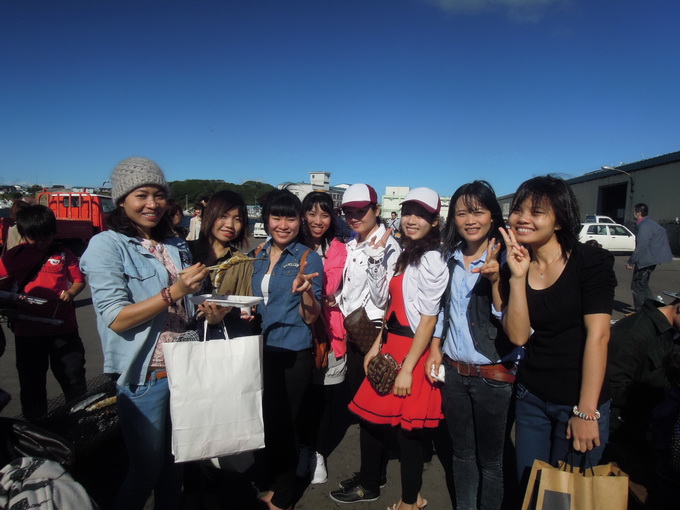A group of seafood processing interns and workers from Vietnam have become a familiar part of daily life in Nemuro, Japan’s easternmost city, located on Hokkaido Island, over the last year.
As the very first Vietnamese nationals to have come to this distant locality, these young people have blown a fresh wind into the city, where most of the population is aging.
Although she has only been an intern for the Kanehiro seafood processing company for less than a year, Huynh Thi Ha, 29, says she already loves her daily life in Nemuro.
Back in Vietnam, Ha worked at a catfish processing plant in the Mekong Delta province of An Giang. At Kanehiro, she is in charge of processing salmon, a job Ha admits is not much different from what she did at home.
But the difference, she adds, is that she can learn from the professional working skills and discipline of the Japanese, while also receiving better pay.
Her friend, Nguyen Thi Kim Yen, says the work schedule at Kanehiro inspires workers, rather than exhausting them.
The 31-year-old intern says workers are given a short five or ten minute break after every 60 minutes of work. A shift ends at 4:30 pm, and employees leave at 5:10 pm after cleaning up.
Kanekome Takaoka, another Japanese seafood processing firm, has its own method of keeping employees relaxed and interested. The company has equipped its break room with sewing, knitting, and embroidery kits for female workers to use during down time.
Besides widening her knowledge of seafood processing, Yen says, the Japanese internship has helped her learn the renowned gentle and meticulous working style of the Japanese.
“The instructors and managers are all kind and helpful to female Vietnamese employees,” Yen says, adding that local residents occasionally give small gifts, like workwear and tools, to the guest workers.
Yen speaks fluent Japanese after spending nine months studying the language before departing for Nemuro.
“The superiors never scold their subordinates, but gently explain whenever they make mistakes,” she adds.
At Kanehiro 20 out of the 120 employees are Vietnamese, while Takaoka has 12 interns from the Southeast Asian country.
The Vietnamese take care of themselves and spend time shopping and cooking together. They study Japanese or go to the supermarket in their free time, and even go bowling with tickets granted by their bosses.
“Life is full of peace and fun,” Yen says, while admitting that homesickness is the only negative.
Building bridges
Hideki Hirota, director of Kanehiro, says whenever he looks at the Vietnamese interns, he recalls the image of the Japanese people of his generation 30 years ago.
The typical characteristics of people at that age are hardworking, diligent, and ambitious, the 67-year-old manager says.
“It’s also the image of me and a generation of young Japanese who were willing to study and work hard, and I think it is a very important trait that can help them succeed in the future,” he adds.
Diligence is also what impresses Kanekome Takoaka chairman Takaoka Yoshihisa about the 12 Vietnamese interns at the company the most. As a result, Yoshihisa says he is seeking to recruit more Vietnamese interns in the future.
The first ten Vietnamese interns arrived in Nemuro in 2011, and the second batch of 25 people followed suit just a year later.
While foreign employees may face difficulty in applying for an internship or a job in other cities, Nemuro authorities have strongly supported Vietnamese.
The city mayor, Hasegawa Shunsuke, even encourages local businesses to accept more Vietnamese interns and workers as part of a plan to fortify ties between the two countries.
When they return home after working in Japan, these people will be the “bridges” to boost Nemuro’s trade partnerships in Vietnam, he says.
The Nemuro Chamber of Trade and Industry has said it is speeding up the process of getting more Vietnamese to intern and work at city-based seafood processing companies.
Chamber officials said this will form a good basis to introduce Nemuro seafood products to the Vietnamese market.
From the Vietnamese view, sending interns and workers to the city is also seen as a way to forge a cultural link between the two nations.
“Moreover, after returning home, they will greatly contribute to their economy and society with the knowledge and skills they have learned from Japan,” says Le Long Son, director of Esuhai, who organizes Japanese internships for Vietnamese.





















































